#i mixed some japanese and western meanings
Explore tagged Tumblr posts
Note
On the topic of the ao3 ship stats thing, I would also like to call into question the inclusion of the "Race" category and how races are being categorized and if they should be included at all.
The first thing is that I see Latino is considered a race, but I believe Latino is moreso a cultural/ethnic category and not a race. It makes it more interesting that Afrolatino is separate from Latino, since it means that everyone categorized as Latino could be white Latino characters and therefore not as racially diverse as the category seems to imply? Or something?
Same goes for the Asian category- wouldn't it make sense to separate it into East/South East/South Asian at least since Asia is massive. Especially since it would be interesting to see the % of Asian representation that is taken up by East vs. South East Asians, given that K-pop, anime, Chinese BL, and Thai BL are all very popular.
I don't think that it's a bad thing to include a race category when taking into account this data, but the fact that these racial categories seem to be arbitrarily decided makes it less reliable in my opinion. Also what about characters who are mixed race, or mixed ethnic heritage?
In some ways, I think it would be more interesting to categorize the origin of the media/source material for these ships. How much of the chart is taken up by Korean origin ships (i.e. K-pop groups) vs. Japanese origin ships (i.e. anime) vs. American origin ships (i.e. American movies and TV)? It would also a valuable insight since I would expect something like Thai BL to have all or majority Asian characters. So in some ways, the race category is more insightful into the diversity of American/UK/Canadian/etc. media. It would also be interesting to see how much of the Asian characters are coming from Asian media/music groups.
This is not to say that analyzing the racial/ethnic/cultural backgrounds of characters in the most popular ships wouldn't give insights. I think it would be interesting to see how this changes over time. But I think that if we want the data about racial discrepancies and diversity to be meaningful, the categorization must be consistent and done with more care.
--
Lulu seems like a nice person, but she is a dumbass about Asian media. She told me once that she was shocked the year BTS suddenly popped up all over the top ships.
Like... really? You were shocked? And you literally had never heard of BTS? As a fandom researcher? If that had been 2013, sure, fine, but it very much wasn't.
This isn't even about being Western-centric because shittons of fans in the UK and US are into Asian fandoms. (UK because that's where she's from. US because that's the place we all wank about being centered all the time.) This is just a basic failure of a lot of meta writers and even academics who study fandom.
Part of why people insist on staying this dumb is that acknowledging Asian media, particularly live action stuff, makes it obvious that the real issue is how the media handles characters. Fans who were all about the white guys all the time still fell hard for Wangxian.
Clearly, fandom has no problem attaching to nonwhite characters when they are the unmarked ethnic majority leads in something. So the supposed failings of fic might be about skin color or antiblackness specifically, or they might really be about the failings of media when it either fails to include certain characters or sidelines and others the ones it does have.
Those conclusions aren't as tidy and don't make as good a tire iron to club other fans with.
104 notes
·
View notes
Text
my thoughts on the presence (or rather, lack thereof) of dub-con in alfons’ route in en
thank you for the ask anon! since it contains spoilers for al’s route, i will put under a cut. also it is a long post!
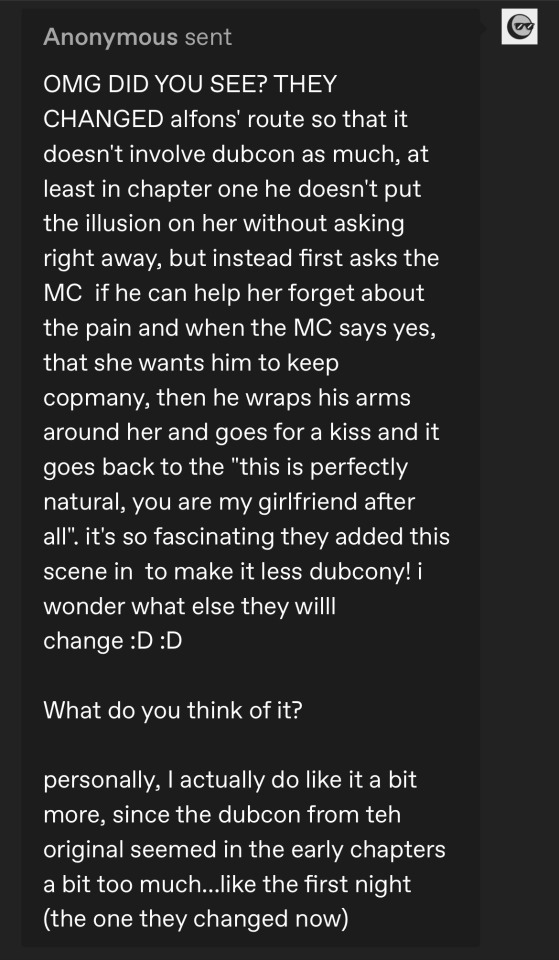
hi anon! i did notice this, yes! they also made changes to some other scenes as well for a similar purpose. as far as i heard, it is sort of a general trend for the en localization to water down scenes that may be considered dub- or non-con; apparently, they have done this with other ikémen series games like iképri.
in alfons’ case, though, i have some mixed feelings overall abt doing so in this route. i hope i can explain myself ok!
on one hand, i think making it more “soft” so to speak does make it feel more accessible for readers in the western fanbase, who in general seem more sensitive (?) to the presence of dub- or non-con, compared to japan. i would honestly love for many people to be able to read his route and not feel super uncomfy? while doing so. so in this respect, i can get behind this decision.
that said.
i feel like other aspects of the story have been sacrificed as a result of this. i believe that, in the original story, scenes play out the way they do for a reason. if there is dub-con, they probably arent putting it all in just for the teehee dubious consent teehees. for example, part of what made this story interesting to me in the japanese version was that against the so-called conventional notion, sex was not used as a means to bring characters closer together, but more so as a way to make them more distant. theres this sort of irony and a theme of isolation (ironically in part due to sex) that i felt was more apparent in japan, in part highlighted due to the dub-con. i feel like making kate want this beforehand is more safe, yes, but also it sort of waters down this irony a bit compared to japan imho.
another consequence is in kate’s character. i think its kind of a strange change that in some parts of the story surrounding those scenes, kate is pretty insistent on facing reality to the fullest, but then one ask from alfons and shes ready to indulge in a fantasy, away from reality, as she asked for it. but despite that, she tries to push him as far away as she can. it sort of makes me feel there’s a gap or blip in her character if that makes sense. part of what made these scenes dub-con maybe is how alfons wanted to give an escape to kate via sex, but kate didn’t want that escape bc she wants to face reality. it creates more conflict between them.
part of kates character development in alfons’ route, too, is going from being staunch in the start of the story, to learning, questioning, and deciding for herself what is considered right? and what is considered wrong? as the story progresses. but with the whole kate wanting it since the beginning, this flaw is sort of lost since the start, making her development feel a bit more static, as by her saying yes to alfons since the beginning, it already establishes her as someone who wants to see reality, but also knows to see the benefit in an escape or a fantasy, when this is sort of what she is meant to develop into by the end.
ftr im not saying these things r completely lost! just that they feel a bit watered down? a bit less engaging? if thats the word, as a kinda byproduct of softening up the dub-con scenes. so i feel the impact may be a bit less compared to japan. but, again, i do understand why they chose to make such changes as well to en.
overall, i dont hold very negative thoughts abt it. nor do i really fully like it either. maybe its bc i play on both servers, but i feel like en just… doesn’t get an experience you could get in japan, which kinda gives me mixed feelings in a way as well, i suppose. i kind of feel that en deserves to read what was dished out in japan, without it being chosen for the fanbase what should be hidden from them (had there not been fan translators translating stuff more “word for word.”)
#ask#anon#ikemen villains#ikevil#イケメンヴィラン#ikevil alfons#ikevil alfons sylvatica#alfons sylvatica#ikemen villains alfons#cybird ikemen series#cybird ikemen#cybird otome#ikemen series#otome game#otome#kuri.txt
79 notes
·
View notes
Note
Someone might have already asked your opinion on this but why do think Rollo became so popular in Japan? B/c I definitely think part of it is because he's voiced by Hiroshi Kamiya

Apart from having a popular VA, I believe it’s also in part because Japan has a “quiet” fandom culture. Meanwhile in the west, it’s more common to decry or brand dark (or even just potentially dark) content as problematic or to be skeptical of them; we saw this play out when Rollo was first announced in JP: Japanese fans were very excited for him whereas English speaking fans were hesitant to embrace him and made accusations about his character before he even had any real screen time. It’s taken a lot longer for English speaking fans to warm up (yes that was a pun) to him. In that sense, JP fans had more initial positive or at least more open-minded) exposure to him, meaning more of a meaningful bond was able to be established.
Another part of it is also his “aesthetic”. From what I’ve been told, religious imagery is prominent in Japanese pop culture. The fact that there are parallels to it in Rollo’s design and character probably has some kind of effect on how he’s viewed. There’s of course also religious imagery in Western pop culture, but it tends to have a more mixed reception, especially among younger members of the audience.
Additionally, Disney villains are super popular over in Japan (yes, even more popular than in the West). Tokyo Disney even has a recurring Halloween event exclusive to them (Disney Villain Recruiters) where they have minions of villains go around trying to recruit park guests to their cause. The Hunchback of Notre Dame movie is also extremely big over there (this is according to my sources, who have actually lived there and/or visited Japan). So Rollo, being a morally grey pretty boy twisted from one of the most well-known Disney villains… yeah, I can see why he’s beloved.
(I want to stress this though: the JP fans like Rollo not because they think he’s the same as Frollo, and nor does liking either character mean that JP fans support what they stand for. They just like the interpretation and reimagining that is Rollo; they still treat Rollo like his own character and can still acknowledge his faults.)
#twisted wonderland#twst#disney twisted wonderland#Rollo Flamme#Rollo Flamm#notes from the writing raven#question
417 notes
·
View notes
Note
Is Vgen safe to use? I'd never heard of it before you mentioned it but it looks cool
this answer's going to be a bit roundabout because I don't feel comfortable directly vouching for anyone who handles money besides myself. and I don't even vouch for myself
so, vgen is basically a non-japanese* (*: primarily western, but that's more of a demographic thing than a platform restriction) version of skima mixed with skeb, both of which are existing sites that japanese artists use to take sketchbook style requests
pixiv also does this now, along with a few other japanese sites, but it's generally been kind of limited to being an otaku thing, even outside of japan, and it's very often been limited to japanese artists actually taking these requests (even if anyone can send them) because of legal issues around international payment
for context, skeb's request-based style of commissioning gained a lot of popularity because it's, frankly, antisocial in a comfortable way for both clients and artists
[you can skip this section if you know what skeb is]
you can think of it as paying an artist to draw something with the understanding that you are paying for the literal act of them drawing it, rather than for a refined and specific finished product
in this format, the requester puts money on the table alongside a brief outline of what they want and any applicable references. there is usually an outline of how much you should pay at minimum, some examples of that artist's work, and (traditionally) a hard rule that neither party in this arrangement communicates with each other about it outside of the request-accept-send-tip procedure itself
traditionally, when the artist accepts the request, the platform takes the money and holds it in escrow. then, when the artist sends the finished work, the exchange is concluded with the requester receiving the work (possibly along with a written note by the artist) and the artist receiving their payment from the site. if the artist doesn't finish the work before an agreed-upon deadline, the money is refunded
in the original skeb format, if the requester especially enjoys the art, it's customary to tip the artist, which applies a golden border around the art and allows the requester to include a thank-you note, displayed alongside the artist's commentary and their original request
this is important to lay out because, as you might notice, there are no windows for revisions and no active direct lines of communication allowed. I've seen people get angry about this before, so that's one way in which the skeb style of commission can be considered "unsafe"
there's a lot of misconceptions around the differences in legal rights here, but the bottom line is that, when it comes to commissioned artwork, most people on the english-speaking internet are profoundly misinformed about the laws around things and operate largely on handshake agreements that wouldn't really hold up in any court, if push came to shove
[end skip]
so! let's get to vgen
vgen, being an adaptation of this format, actually mixes in a lot of different features that I would consider to be more traditional for western art commissions. it carries over the skima/skeb style storefronts, but adapts them more towards serving vtubers (a common use case for skeb and skima) with a slight tilt towards the client having additional protection
for example, to open an artist storefront on vgen, you have to either be invited in by someone or pass some variety of notability verification test (either an engagement baiting post including your art or winning a contest of some fashion)
to make requests, you just kind of make an account and send the money
skeb style commissions do exist on vgen, but the site is designed to allow additional stages of artist communication on certain requests. this means that you may get some extra securities as a client, or you may not, depending on the terms of the request
one notable rule of vgen which makes it distinct from similar sites is that you can't draw porn on there. this may come as a shock, because people aren't great about following that rule, but it is actually a pretty firm rule on account of the site being more beholden to major western-centred payment processors
so, as far as the site itself goes, if you keep yourself familiar with the rules and actually read the terms of your deals, you're safe there in the same way that you're safe when making a conscious decision to climb a tree
as far as financial matters and the site's management go, I don't know, and I can't know because I don't know the staff personally
I have made a personal decision to trust that they're acting in good faith. I've made a request through the site before to test it out, it went as expected, so my decision to use it is informed by my own sense of risk management
TL;DR: is vgen safe to use? I don't personally think it's uniquely risky as far as storefronts go, but it's an online storefront where people sell each other things, so treat it as one and walk about as carefully as you always do
36 notes
·
View notes
Note
Let me start with saying i love your blog really really much, this is something that has been rent free on my mind since Diasomia's arc started, is Malleus' father a dragon fae? I read the translations of chap 7 and i don't think i saw it mentioned, they just stayed vague on what kind of fairy he was, many fans started saying he was not a dragon, if that would be the case doesn't that mean Malleus is an half-blood!? The dragon bloodline isn't pure!?
Meleanor rejected many dragon suitors to marry the person she loved, whoever he was, why not say if Levan was a dragon or not, this is stressing me out. Especially since i saw the Crowley's theory.
Hi thank you so much for this question! I actually also wanted to address this, as I've seen some people (particularly on Twst EN Twitter and Reddit fandoms) who believe that the "Malleus is half Long because Levan is a Long" theory is canon. It's actually just one of the common theories which are:
He is a Long prince/noble.
He is simply a Raven fae. This is also why many believe that Levan is Crowley as both ravens and crows are collectively karasu in Japanese.
Let me put on a disclaimer that I'm leaning more on the theory that Levan might not necessarily be Crowley, but he is indeed a Bird Fae-- because his name does sound like Raven in the Japanese language, and the fact that Malleus' Platinum Jacket portrait has both Maleficent and her loyal raven Diablo in it. You are correct that there was never an explicit reveal on what he was though.
~ A short explanation on the first theory ~
So how did the first theory come to be? Because his official title in Briar Kingdom is 竜眼公 lit. Dragon Eye Lord. Some people have taken this literally and assumed that it means Levan is a dragon; more specifically, a Long. That's because the 竜 in his title is a kanji character and Twst happened to exactly distinguish in the Endless Halloween event an Asian Long 竜 (in kanji alphabet), and a western dragon ドラゴン (in katakana alphabet). Malleus specifies that he is a ドラゴン.
Now while theorizing that Levan is a Long is somewhat valid, it's less likely. Because a) it's common practice in Japanese to use kanji in formal titles and unusual to use katakana which is why ドラゴン was not used, which means b) Levan's "Dragon Eye Lord" title is just to indicate that he is Meleanor's eyes, as Lilia described him in the same chapter. This is also what Diablo's role is in the original movie.
~ Commenting on the theory that Levan is a Bird Fae ~
This is the most likely logical theory at this point, and you're correct that this means Malleus is half a dragon, half a bird. However, it's looking more and more like the fae are going with Mendel's Law of Inheritance with the Draconias' genes as extremely dominant that all other genes mixed in become recessive. Which means that while they're technically not pure-blooded dragons, the dragon genes will always appear in full view anyway so they might as well be pure. This is probably why Lilia mentions that the Draconias are "descended from dragons" rather than simply dragons. They may have varying fae species packed in their blood, but the dragon genes just completely cover them like a wallpaper lol.
Thanks so much for asking this! It was a fun write!
#twisted wonderland#ventique rambles#malleus draconia#papa draconia#meleanor draconia#ventique answers
172 notes
·
View notes
Note
do you have any thoughts on where rin could be from? I've seen ppl say she could be Chinese or Malaysian but there's barely any info on the eastern archipelago other than Wa
This is a fun question! We have very little information to go off of, that's true, but we do know some things!
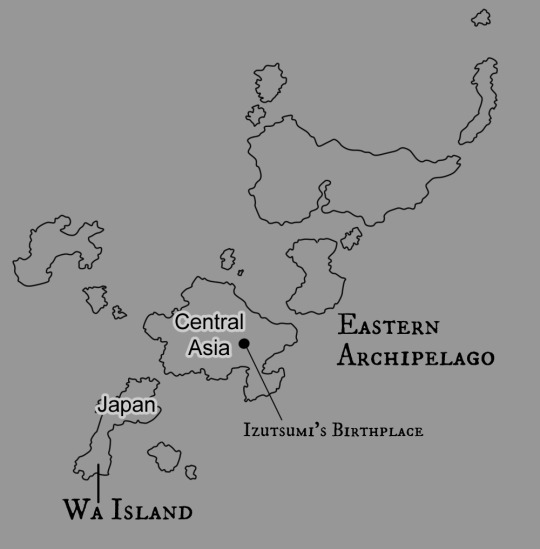
(This is an excerpt from a map of the Dungeon Meshi world I'm working on for my essay.)
This is what the Eastern Archipelago looks like, minus the one medium-sized island that is populated by dwarves.
Wa Island has a culture similar to the Sengoku period of Japan.
Izutsumi is from the large island to the northeast of Wa.
Izutsumi's succubi turned into a woman wearing Central Asian clothing similar to a Mongolian deel, and Izutsumi thought that this was an illusion of her mother. Though we now know this isn't exactly true, the succubi is a psychic monster, so it must have pulled the clothing from Izutsumi's memories, something that she recognized from her childhood, and would expect her mother to wear. Since clothing like the deel doesn't seem to be worn in Wa, we can assume that this type of clothing is worn on the island that Izutsumi is from instead. So this island may be similar to Central Asia, which consists of Mongolia, Kazakhstan, Kyrgyzstan, Tajikistan, Turkmenistan, Uzbekistan, and Afghanistan.
We know that ogres used to control the Eastern Archipelago, and on the ogre race illustration page, Kui shows the majority of the ogres wearing clothing that could be influenced by Chinese, Japanese, Korean or Mongolian clothing. 7 of them have Asian-inspired clothing, 4 have indistinct but not-Asian looking clothing, and the rest have no visible clothing.
We don't know what any of the other parts of the archipelago are like, but I think it wouldn't be crazy to assume they resemble other parts of Asia, such as China, Korea, etc.
The far eastern side of the Archipelago is neighbors to the Western Continent, a region that appears to be home to Greek, Roman, and South and West Asian cultures. So it would make sense if some cultural influence from the West naturally migrated across the ocean to the far-far East.
Now, what do we know about Rin?
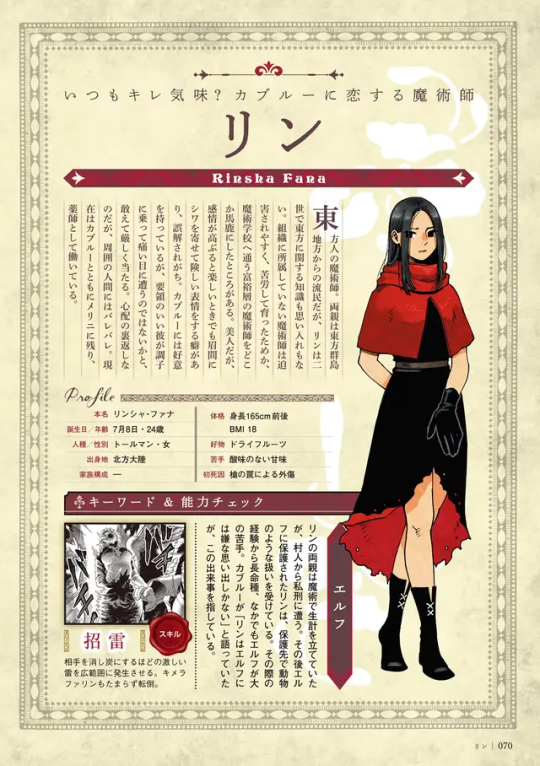
The beginning of her bio reads: 両親は東方群島 東地方からの流民だが. This translates as: "Her parents were refugees from the eastern region of the Eastern Archipelago." This is interesting because it's different from the official English translation by Yen Press. Their translation skips the second mention of the east, and also calls her parents wanderers instead of refugees: "Her parents were wanderers from the Eastern Archipelago." The original Japanese says east twice, 東方群島 (Eastern Archipelago) and 東地方 (Eastern region). I think the translator, a contractor who doesn't have time to fact-check, maybe didn't understand why Rin's bio said east so many times (the sentences before and after also mention "east" many times) and just didn't bother including what seemed like a redundant mention of it.
SO WHAT DOES THAT MEAN?
What it means is we actually know what part of the Archipelago Rin is from!
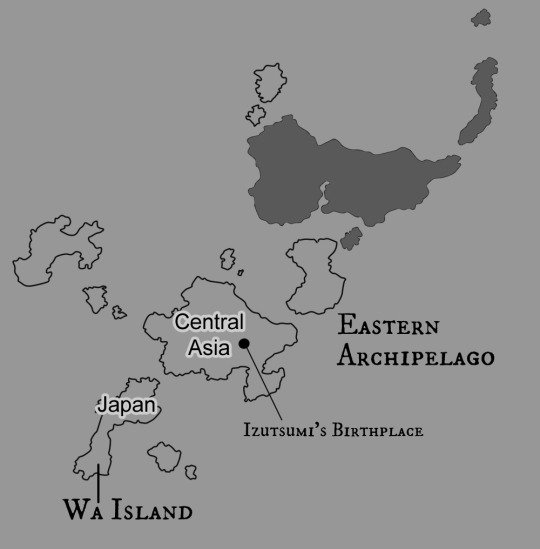
Obviously this is only speculation, but I would guess her family originally came from one of the islands I've colored in dark gray here, since they are the furthest east part of the Archipelago.
WHAT CULTURE COMES FROM THOSE ISLANDS?
(I talk about some of this in chapter four of my Dungeon Meshi essay in the section about Rin.)
We don't know! However, remember what I said about how the far-east of the Eastern Archipelago is neighbors with the Western Continent?
The Western Continent is a region dominated by western elven culture. Therefore it makes sense that this part of the Archipelago should have had the most contact with the elves, and foreign tall-men who are a part of elven culture. There should be cultural mixing between the two groups... And there is! Rin's name is evidence of it!
Rinsha Fana (رينشا فناء), is an Arabic name. Arabic is one of the languages Kui associates with the Western elves, which would mean that in-universe, Rinsha Fana is an elvish (or at least Western) name.
THE SIMPLE ANSWER
It's possible that there is a fusion culture in the far eastern islands, and it's the natural result of contact between the West and the East.
Since Rin's name is Arabic, we could theorize that the far-east of the Eastern Archipelago is similar to various Asian cultures in the real world that were influenced by the Arabic world historically.
The ones that I could find are Myanmar, Cambodia, Vietnam, Thailand, the Philippines, Brunei, Indonesia, Malaysia, China, Uzbekistan, Kyrgyzstan, Tajikistan, Turkmenistan, and Kazakhstan.
So the Fana family's home island might be similar to any of those! It's a long list, but it does narrow things down a little bit!
THE COMPLICATED ANSWER
In addition to the fact that the far-eastern islands are physically close to the Western Continent and there being some cultural fusion there, we also know that there are groups of elves in Dungeon Meshi who behave similarly to missionaries in the real world.
There may or may not have been a religious component, but these elves felt it was their moral duty to spread elven culture and knowledge (including elven style magic) to the short-lived races, and improve their standard of living.
Since the far eastern islands of the Archipelago are the closest to the West, it makes sense that elven missionaries would have had a presence there, just like it makes sense that they would have had a presence on the far western coast of the Eastern Continent.
It's strongly implied that Rin's parents may have practiced elven-style magic, since if they had practiced Gnomish magic (the dominant style in the Eastern Archipelago and the Northern Continent), they might have been able to join a local organization (a church, a school, a royal court) in the Northern Continent and not been lynched. Something about their magic was "foreign" and scared the people of the Northern Continent.
The original Japanese text explicitly says they were lynched (私刑).
Kui also explicitly tells us that Rin’s family was lynched in the Northern Continent, using the word 私刑. Lynching is an extrajudicial public execution by an in-group against someone who is outside of their social circle, who has somehow “transgressed” against the in-group. Usually the “transgression” is something like being a foreigner, being of a different race, different ethnicity, practicing a different religion, or behaving in any unusual way (being neurodivergent, gender non-conforming or homosexual).
The Fana family fled the Archipelago, didn't change their family name, and then gave their daughter a western/elven personal name as well. This implies that they are unwilling to give up their culture, even under circumstances where it would be safer to assimilate. This suggests that the culture is very important to them.
WHY DID RIN'S FAMILY LEAVE THE EAST?
We don't know exactly, but the original Japanese text says they were refugees. This implies that they left their homeland due to some kind of danger or threat to their lives.
We know that the Eastern Archipelago is constantly at war with itself, and that could be enough reason for a family to flee. But because of the history of Christianity in Japan, Rin's name, and her family's behavior, I think there may be something more to it.
We know that there are treaties between the nations in Dungeon Meshi that prevents the long-lived races from colonizing the Eastern Archipelago. The nations of the Eastern Archipelago most likely consider any influence from the long-lived races a threat to their sovereignty, and they are probably making an effort to keep long-lived races and their culture out of the region.
This sounds very similar to Sakoku (鎖国 Literally "locked country") an isolationist foreign policy in Japan that began at the end of the Sengoku era (the era that Wa appears to be in the middle of). Under this policy, relations and trade between Japan and other countries were severely limited, and nearly all foreign nationals were banned from entering Japan, while common Japanese people were kept from leaving the country.
The sakoku policy was enforced in order to remove colonial and religious influence from European countries, which were perceived as posing a threat to the stability of Japan.
Japanese people who had converted to Christianity were seen as traitors, and missionaries were foreign enemies trying to undermine Japanese society. Conversion to Christianity, the dominant religion of Europe, was seen as the first step of European nations trying to colonize Japan.
Part of the sakoku policy was the Japanese government officially persecuting, torturing, and executing somewhere between 2,000 and 5,000 Japanese Christians and foreign Christian missionaries. This forced Christians in Japan to either go into hiding, flee the country, or renounce their faith in order to survive.
I think an attitude like this towards foreign culture would logically be common throughout the entire Eastern Archipelago, and not just the island of Wa.
So local people like Rin's family who might have adopted Western elven culture (magic, names, clothing, etc.) may have been seen as a threat, and may have been pressured to renounce their ways, or leave.
The cultural backlash would be extreme, and could easily cause civil war and instability, especially in any areas that have a large Western cultural influence, like I've theorized the Fana family's home island to have.
In the end, I think no matter which way you choose to interpret the information, it's clear that Rin's family has a connection to both East Asia and Arabic culture... So start there, and see what cool ideas you can come up with!
54 notes
·
View notes
Text
tbh I don't believe any of the ninja are white except for Jay but it's only his bio mom who was white
for my hcs personally its
cole - Romani
Nya + Kai - Chinese/Filipino
Lloyd - Japanese/Chinese (plus Oni and dragon obviously)
Zane - Black/Indian
Jay - Chinese/White
Wu + Garmadon - Fully Oni/dragon hybrids but their human forms are Japanese/Chinese
Pixal - Vietnamese
Misako- Japanese
I mean technically Zane and Pixal don't have races but they still have the features and when they use their cloaking device (Pixal has one but doesn't use it often if at all) those are the features they have ☝️🤓
I know that Ninjago is kinda of a mix of multiple cultures from both Asia and Europe like Oni come from Japan, the Yin/Yang engagement Jay and Nya had and the Festival in the 8th season is Chinese, the style of the monestary and some other places are also Japanese, the Dragons in the show are of the western + eastern variety and also a lot of things in the show are a lot like western culture too.
idk I'm rambling but listen they're my favorite characters obviously I wanna talk about them!! 🙁
#ninjago#lego ninjago#hcs#idk im a nerd okay#lloyd garmadon#kai smith#cole brookstone#zane julien#jay walker#sensei wu#lord garmadon#pixal borg#LIKEEE ugh god i was this bad wjth mha too you should've seen the endless hours i spent rambling about it#someone sedate me
88 notes
·
View notes
Note
This blog is really fulfilling my near constant need for long lectures over fandoms that I never really get to flex out huh? I'm going to start making powerpoints. Alright, time to explain Ivankov and Bon Clay with a quick history of the LGBTQ+ community in Japan. Disclaimer: I am not Japanese, I am from a western country, but I will try to do my best to summarize the history and connotations to the best of my ability. I also do understand that some of the genderqueer characters do seem to be based on stereotypes, but that will be explored.
Okama is slang interchangeably used for gay men, drag queens, gender nonconforming men, and transgender women. It is very similar to the English word "Queer," especially in the idea that current members of the LGBTQ+ community are attempting to reclaim it as a positive phrase, rather than the slur that has been used against them. A large part of Japan still conflates gay with crossdressing or transgenderism, which is why homosexual men are sometimes referred to as okama (literally a 'pot' but meaning something similar to the English word 'queen') and are usually represented as cross-dressed and effeminate. The use of the term okama derives from the slang usage of the term to refer to the buttocks and thereby to anal sex which is considered to be the definitive sexual act engaged in by homosexual men. Homosexuality in Japan has had a fraught history that I do not have the character space to completely include here. Bon Clay is a character that first appeared in One Piece in the year 2000. Now, I know a lot of modern day fandoms do not understand the history of queer characters in media. This was long before we had shows like The Owl House, Steven Universe, Yuri on Ice, or She-Ra (I can't think of a lot of modern queer anime off hand). We had very little canon queer characters, at at the time, it was far more common for queer characters to either be women (Sailor Uranus, Utena), or male villains. And Bon Clay was not only queer, he was an out and proud Okama. He was referred to both as a man and a woman, and sang an entire song "Okama Way/Oh Come My Way." Bon Clay, despite being a villain, got a redemption, he befriended the Strawhats, and helped them to escape from Alabasta, even though he himself was sent to jail instead.
“One may stray from the path of a man. One may stray from the path of a woman. But there is no straying from the path of a human!”
In the end, this world is broken down to men and women But I'm a man who is a woman So I'm the best (the strongest) The best (strongest!) OH COME MY WAY
Emporio Ivankov
As Mod pointed out, his design is based off of Doctor Frank N' Furter from Rocky Horror Picture show and Norio Imamura, a real life Okama and a member of Mayumi Tanaka's acting troupe whom Oda met. Ivankov is gender fluid and uses their fruit to switch between whatever sex characteristics they want to have. Ivankov refers to himself as a "Newkama", as opposed to an "Okama". This is a double pun made by mixing words. It basically goes "Newhalf" (Transgender) + Okama (Crossdresser) = Newkama (Newcomer). Newkama claim to go beyond the concept of gender since almost every one of them has experienced life in both male and female bodies thanks to Ivankov's Horu Horu no Mi. Also, there is a question on what pronouns Iva uses, with in the Japanese text, they appear to use something like Neo-pronouns, always replacing the first character with a V in the pronouns they are using (Vatashi vs Watashi for "I" but I do not know enough Japanese to speak on this or how their pronouns should be translated)
She was the queen of NewKama Land in Impel Down, a secret haven inside of the prison where prisons escaped to. (This is why Mod jokes that One Piece fandom took over Horny Jail, we have a gay club in our jail in source material that was created by a transgirl and maintained by genderqueer okamas. We cannot be stopped). She is also a member of the Revolutionary Army, (MANGA Spoilers: A former slave), and Queen of Kamabakka Queendom, a place where okamas can be free to live their lives with no criticism and to just, be themselves.
Now, I understand why the artstyle turns people off and makes them seem like harmful stereotypes, and they aren't always treated well in the story. While Luffy is extremely accepting of Ivankov and Bon Clay (The only people in the entire story he refers to with honorifics are them, and he uses female honorifics, Iva-Chan and Bon-Chan), Sanji has shown to be pretty transphobic. But I also think that they encapsulate the messages of One Piece: Complete and Utter Freedom. The Freedom to be true to yourself, to live your authentic life, and to live without regrets. These characters are not only strong, respectable, and free, but they fight for that freedom for others as well.
There is no queerbaiting in One Piece. The only canon LGBTQ+ Identities we have are the transgender characters, probably attributed to Oda not wanting to write romance, and thus it is harder to make canon gay/lesbian/bi ect characters. Luffy, on the other hand, is argued heavily whether he's canonically aro/ace, or just heavily coded. We have other queer characters as well, especially in Wano. Kiku is a transwoman, and Yamato is a transman. Bon Clay, Ivankov, Inazuma, and other "Okamas" are genderqueer, although the identies may not translate nicely into English. Some of it may not have aged well as well (The use of "Transvestite" for example). But overall, the LGBTQ+ Identities have been respected by the narrative of the source material if not necessary by the characters or author. (And definitely not by some fans). Its also important to remember, Bon Clay was introduced in 2000. Kiku was introduced in 2018, that is nearly 20 years to learn how to depict trans people. She has no gags, she just exists as she is. Oh, and none of the queer characters die in the series, and Bon Clay even has the quote "Queers will never die!"
(Morley should probably be added to this analysis, as a transgender woman who pretty controversial, but she doesn't appear much in the manga/anime so I don't know a lot about her lol. I'm also not going to touch the "debate" of Yamato's gender here)
Sources: Male Homosexuality and Popular Culture in Modern Japan
One Piece: A Queer Retrospective
For context, they are responding to this post about Emporio Ivankov and Bon Clay

Well done! Great job! You deserve a cookie. Because this is why I love Defend Your Blurbo. Emporio Ivankov and Bon Chan would be proud of you
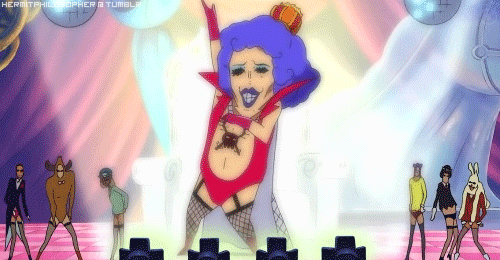
Fun fact, the horny jail reference actually comes from the bg3 fandom and the narrator outtakes. I just think it's very appropriate for the One Piece Fandom at least when it comes to my blog and what you guys have put me through
#defend your blurbo response#fandoms and media literacy#emporio ivankov#bon chan#bon clay#one piece#anime#not a poll
65 notes
·
View notes
Note
Hi! I know you already discussed this with the hxh yanderes, but do you think some yanderes in demon slayer, hashiras and demons, would want to get married to their darling? Hashiras probably would, but i'm not so sure about demons.
Hi anon!!
I'm always happy to write about kny, and this is a good question! I'm not too much of a buff on Japanese history/historical time periods, so hopefully I'm not too factually off - based off of Tanjiro's reactions anytime skin is shown/ Zenitsu's insistence on marriage, I'm going to guess that marriage was probably more expected than it is today. So we're going to move forward with that in mind!
(Also I know next to nothing about traditional Japanese weddings, so you're getting my Western norms/knowledge... sorry! Also, I'm still debating on whether I want to write Mitsuri and Obanai as separate or poly yanderes because I really can't stomach the thought of separating them, so you're getting poly for this!)
Without further ado, let's discuss!! (This is long I apologize)
First of all, you're right - almost all of the Hashiras have marriage on the mind once their obsession forms. They're dreaming of you in pretty white gowns, boquets of flowers everywhere, and a pretty, glittering ring on your finger. There's something comfortable and good about knowing that you're safe, that you're protected, that you're theirs, both in the eyes of the law and of each other.
The demons, on the other hand, are more of a mixed bag - none of them really remember their time as a human, but some are more connected with their human sides than others - and thus, some of them are much, much more desperate to make you theirs in a way that satiates their remaining scraps of humanity. (Plus, this is a way to bind you to them that the demons know you'll recognize the weight of - after all, it's not like divorcing them is really an option; you can't even run two feet without them immediately catching and immobilizing you. What makes you think you could ever truly escape them?)
But of course, let's start with the beloved, oh-so-righteous Hashira. They each have a different level of motivation for getting you to share their last name - personal trauma, dependency, and their awareness of your feelings for them make each individual approach in asking for your hand very unique.
(Though each is laced with just a hair of hesitance, their vulnerability coming to light when they pop the question, because even if they've already stolen you away, even if Stockholm Syndrome has already bent and warped you, there's still the possibility of rejection. There's still the possibility that you don't want them as badly as they do, that you don't need them like they need you. You'll say yes, they'll make sure of it, but you need to mean it - you need to love them, too.)
Kochou Shinobu wants to marry you, and while she won't force you to, she's not too shy to drop hints. In general, she's not too terribly controlling, aside from her extreme overprotectiveness, and this extends to her plans of marriage with you.
She wants to bind you to her permanently, to get you officially and legally tied to her in a way you can't deny no matter how badly you may want to, but she won't force it. After all, while she does force you into all sorts of things in the name of protection and your wellbeing (forcing you to eat certain foods, keeping you inside the Butterfly mansion with scheduled times for you to sit outside in the garden, and a whole variety of other things that make you bristle with indignation and shame), she wants big steps in your relationship to be consensual.
(Aside from your kidnapping, of course - though she sees your captivity less as a step and more of a necessity, more of something she's doing to make sure you aren't the victim of some horrible, disgusting demon. And, of course, so that you're alive and well and she can see you and hear you and smell you and touch you.)
She'll pop the question once she thinks Stockholm Syndrome has set in, and even then, the moment is actually quite nice. She'd set up a nice meal for you (with foods you actually like, not the overly healthy, bland slog she always forces down your throat), with a few candles glowing and nice, fluffy blankets surrounding where you both sit on the floor.
Her voice is strangely soft and sweet when she asks you, this odd look in her eye that almost looks scared, as if she's genuinely afraid of how you'll respond to her slightly wobbly will you marry me? She wants you to say yes, needs it, really, but if you say no she'll respect that.
She won't let you go, of course, but she won't force it onto you. She'll be more distant, a little more snappy, and she'll spend noticeably less time physically close to you, but once she's recovered a bit (meaning she's slaughtered enough demons that her anger is slightly quelled, though the hurt is still very much present), she'll return to you, working even harder than before to make you happy and want her.
Perhaps you'll change your mind if she's more accommodating, if she's sweeter, if she's just better.
Giyuu Tomioka, for one, probably won't ever ask you to marry him.
It's not that he doesn't want to, but rather that it seems like this unnecessary step that doesn't need to happen for your relationship to be stable and happy and loving. He's a bit of an odd duck as a yandere - he's emotionally stunted and difficult at communicating his feelings, and because of this, he often worries that you're feeling things that he's unaware of.
He's paranoid that you secretly hate him, that you're lying every time you say something even remotely nice to him, that you wish he was dead or being tormented by a demon. (And frankly, this isn't entirely false - he does eventually kidnap you, once his hand is forced, and of fucking course you hate him after that - you're terrified of him, and it nearly breaks Giyuu, sending him into a spiral that'll take months of you eagerly convincing him otherwise to move past.)
And because of these fears, Giyuu is hesitant to really do anything romantic at all with you - anything from calling you pet names to cuddling you takes a long time for him to feel comfortable with, and so marriage?
It's unlikely that he'll ask, but not impossible - after all, he does harbor strong feelings for you, finding you on his mind constantly, his hands always twitching and itching to reach out to you, his eyes always seeming to wander back to your figure, his entire body just yearning for you you you.
Giyuu does genuinely want to marry you - he likes the idea of you having his last name, and the idea of being tied to you in a real, tangible way. It makes some of the paranoia quell, because would you really leave him if you were married?
Widows don't survive easily in this world - you'd find it extremely hard to remarry. (That thought leaves a sour taste in his mouth, though he does like that it means you're less likely to leave him.)
So while Giyuu probably won't ever ask, just know that when he's staring at you so longingly, gazing at you with those wide eyes that never seem to blink, he's imagining the way you'd look in lace, how your pretty face would look at him from under a veil, how your voice would caress his name when you say your vows.
It's a sweet thought that he harbors, and it's only many, many years into the future that he'll admit this to you. (And even then, it's only in passing, only when he's in your arms, on the brink of sleep and feeling the most calm and vulnerable and safe he's felt in his whole life - you'll hear a small would you want to be a wife? He won't elaborate if you ask him to repeat himself, instead pretending it never happened, but that's probably the closest you'll get to admittance.)
Kyojuro Rengoku knows marriage is in his future from a young age. He's always dreamed of having a loving family, of having another family for Senjuro to grow close to.
And really, you just make it so easy - it's disturbing how quickly he's fantasizing about dropping to one knee, imagining your face - in detail - when he pops the question; he's sure your jaw will drop, your eyes going wide, maybe you'd even cover your mouth with your hand because you can hardly contain yourself with excitement.
And then you'll say yes - over and over again, crushing him into a hug that he eagerly returns, burying his nose into your hair and smelling and breathing and yearning -
Nights he spends fantasizing about your future normally end with flushed cheeks and sweat coating his body, his chest heaving and dried cum splattered along his navel.
He expects marriage, really, simply because he's a traditional man and he wants to become your protector and provider - he's lenient on most things involving the wedding, however. He's daydreaming about you in your dress, of course, but he'll be delighted with whatever style or color you choose, tears of joy in his eyes when he sees you walking down the aisle towards him, towards your future.
He'll let you decide the flowers and how you style your hair, and he'll even let you choose his own clothing - he will be incorporating the flame somehow, however, and that goes for more than just his clothing. Your ring will have a large, somewhat gaudy opal jewel in it, along with a flame engraved on the inside of the ring, so that you're close to him always, even when he's away on missions.
Kyojuro is so very sure that you'll become his wife one day that even before you're aware of his obsession with you, he's referring to you as my flame and my spouse and my lovely wife both in private and public. It's off-putting and strange, but no amount of explaining or pleading will get him to stop.
He's genuinely dead set on becoming your husband, and he'll even allow you to invite a select group of your family and friends to the event - after all, it's not like they could stop it. What could they do? He's the Flame Hashira, responsible for saving more lives than you could count - he can have whatever he wants, and that includes you.
(At least Shinobu will be on your side at the wedding - she'll watch with sad eyes, sad for you but happy for her comrade, though ultimately she can do nothing as well - even when she sees the way he looks at you, the way his eyes absolutely devour you.)
Marriage isn't exactly necessary for Gyomei Himejima, but it's still certainly a thought that lingers in the far corners of his mind, dancing behind closed eyelids on the rare night he's laying in his own bed, the blankets feeling cold and empty.
He normally wills away any sort of fantasizing about you at night - both on principle and because once he starts thinking of you, you don't leave his thoughts for hours, making sleep - something already a bit difficult for him - even harder to come by. But on the few nights where his self-control wavers ever so slightly, he allows himself to imagine the way your hands would feel with a pretty, smooth ring adorning your finger, standing out against the softness of your skin.
He'll move his own fingers against the fabric of his futon, pretending the lackluster linen is you instead, moving up to cup your face, brush over your hair, let his fingers trace the curve and juts of your collarbone.
He'll let himself imagine coming home to you, how the smell of you would fill his nostrils the moment he opens the door, how your voice would sound calling his name, telling him I'm so glad you're home, my love, it's lonely to be a wife without her other half by her side...
It's a desire he nurses, slowly letting it fester and grow and rot in his heart, and so when the day finally comes that you've given up on fighting him, that you've reluctantly accepted that he is your future now (and after months of him calmly and simply stating that I'm doing what is best for you, you are weak and you need protection, helpless creatures like yourself cannot be left to the wolves), he'll swallow and ask you, with a voice that's just slightly uneven, if you'd do him the honor of becoming his wife, if you'd share yourself with me, both in life and death?
It's not like you really have a choice, but he can't help the tears that slip down his cheeks when you answer him, those big, scarred hands of his slowly slipping down to your hips, excitement brewing in his chest that makes him feel both elated and sinful because married couples show love in much more intimate ways, and he's been holding himself back for so long, far longer than any other man could endure...
Sanemi Shinazugawa is, even to you - the love of his life, the woman he finds himself so ardently and frustratingly obsessed with - difficult to understand. He never explicitly tells you about his past nor childhood, only dropping small, hardly-there hints once in a blue moon.
All you've managed to gather is that something horrible happened to him, and that despite seeming rough and callous and cruel, he's significantly softer at heart than you'd expected.
And so, when Sanemi bites his lip a few months into your kidnapping, his fingers tapping together in his lap and his eyes struggling to stay fixed on you while you quietly and calmly folded the pretty, new kimono he'd just returned from a recent mission with, you're completely floored by his question.
Will you marry me?
It's rushed, nearly slurred, full of doubt and sounding more like a statement rather than a question, but when you freeze and flick your eyes to him, he only furrows his brows and looks angry. Truthfully, he'd been planning on asking you for months - marriage was on his mind embarrassingly early into his infatuation with you, though he'd never made any action to make you believe so.
He has a cold exterior and is outwardly brash and rude to those around him, but he's still the young, caring, gentle boy he once was - and when he's with you, ever protective instinct long buried from his childhood comes back in full force, urging and begging him to wrap his arms around you and protect you from each and every horrible thing in this world.
(And, of course, so that he can feel you - your heart beating against his chest, your breaths tickling his hair, your soft body pressing flush against his own, so opposite to his own scarred, calloused skin.)
And so, when you eventually tell him yes after a very, very long period of silence, Sanemi can only nod and chance a glance at you, a small pink rising to his cheeks because fuck, somehow you're even prettier now, like you're practically glowing, like you're practically his - and now, you are.
He's a lot more gentle to you after you accept his proposal - he's always treated you like you're made of glass, but his touches are even more feather-light now, his voice noticeably softer, his eyes noticeably wider when they follow your every move, this shy, boyish smile slotting onto his lips when he sees you humming to yourself or reaching for something on a high shelf or sleeping soundly in what is now your shared bed.
Marriage domesticates him, and while he's still obsessively checking your health and forcing you to report what you did every moment he's not at home with you, he's different. Softer, happier, needier.
Tengen Uzui pops the question early. Extremely early. The idea of marriage is no foreign concept to him - and as his darling, you are also, by default, his wives' darling. And so, while Tengen alone is overwhelming with his flirtations and overprotectiveness, it's something else entirely to have three other people also doting on you, keeping a careful eye on you and making sure you're always, always out of danger's way and never having a moment of privacy to yourself.
And so, while Tengen is the one who actually asks for your hand, all of the wives are dropping hints and not-so-subtly mentioning how things will be once you're an official wife, too. It's always when you're their wife, not if - and they're not shy about it.
Hinatsuru will be standing behind you while you sit at the vanity, brushing her fingers over your hair and smiling down at you, pink sitting high on her cheeks while she tells you that Master Tengen will buy you the most lovely dress for the ceremony, Makio and I have already picked it out. You'll look so very beautiful, though you always do.
Suma will clutch onto your arm and beg you to do her vows first, to tell her that she's pretty and sweet and beautiful and perfect and exactly your type.
Makio will swat your hand away from sweets when she thinks you've had enough, telling you with a pout that you must stay healthy and not grow a stomachache, I saw the ring in Master Tengen's room early this morning and the whole moment will be ruined if you've eaten yourself into illness!
(Of course, you're allowed to have more sweets if she feeds them to you, but this is just a technicality.)
And Tengen himself is even not particularly subtle about the whole ordeal - he'll wrap an arm around you and plant a kiss to the crown of your head, telling you that the proposal will be quite extravagant, I can't wait to see your face!
Marriage has always been an assumed milestone that you will complete with the Uzuis - it's only a matter of time, and even if you say no over and over again, you will end up their spouse, one way or another.
(It's been such an ingrained concept in their minds, of course, that even before they stole you away, more than one night was spent with all four in bed, each imagining you on your wedding night, laying in silk fabrics with four wedding rings glistening on your fingers and your face all twisted up in ecstasy and their names tumbling form your lips like some sort of prayer...)
Mitsuri Kanroji and Obanai Iguro are both partial to the idea of marrying you, but Mitsuri is considerably more likely to make it a reality.
Obanai wants to wed you, to call you both his wives, to share your bed every night and to know that you're his. But there's still lingering fear and self-resentment that bars him from ever actually asking you simply because he thinks he doesn't deserve someone like you. You're utterly perfect - divine in a way that's hard to stomach, as if the air is being sucked out of his lungs every time he so much as glances at you. He's shy, frankly, and afraid to confront his own feelings, and so it's left to Mitsuri to make your marriage a reality.
And oh, she doesn't mind this responsibility at all - marriage plans are happening early on, her brain filled to the brim with ideas of different color schemes, which flowers to use, which songs to play, even which undergarments to have you wear to make undressing you even sweeter.
She's daydreaming about it near constantly, and similarly to Uzui, she's not particularly great at keeping it a secret. She doesn't purposefully blurt out how good you'd look in a particular dress style, but when she sees you, her brain turns to mush and it's like she has no control of her words.
(Or her actions, it seems, because she'll always, always greet you with a hug that's just a bit too long, your body pressed flush and tight against her own in a way that feels too purposeful to be innocent.)
So as their darling, marriage is likely in the cards - but contrary to others on this list, Obanai will persuade Mitsuri to actually take your wishes into considerations as far as decorations or style goes - you get to choose your wedding dress and the food that's served (Mitsuri's only stipulation is that there is a lot), along with most other personal items you wear/interact with.
So from that aspect, marriage actually doesn't sound too bad with them - the only unfortunate portion is that you're marrying your captors, of course, and the vows. They're long and sappy and extremely detailed, sharing facts you weren't previously aware of but really shouldn't surprise you - admittance of stalking you, stealing some of your clothing or personal items, even to sometimes tampering with your food just to make things 'taste better'.
It's hard to stomach and it's things you really already knew in your heart, but it's hard to hear it nonetheless - especially when it's spun in such a way as to sound romantic, as if it's some testament to their love for you - pretend to be wooed, or things will get ugly. And you wouldn't want your wedding night to be forceful and rough, now would you?
And then of course there's the demons, who have a very, very wide variety of opinions regarding the topic of marriage.
For Muzan Kibutsuji, the context in which his obsession developed is extremely key to how he feels about marrying you.
Most likely, you were some human he came into contact with frequently during one of his many false human aliases. He finds you annoying at first, of course, deeming you as horribly pathetic and someone literally not even worthy of his time to consider, but then one day something changes - some small act of kindness or defiance that piques his interest, and suddenly he's finding himself idly thinking of you, noticing you amongst the crowd, recognizing your scent even in crowded spaces.
And he doesn't like it. At all.
It takes him a very long time to navigate his feelings for you - he's intrigued and feels this strange, carnal urge to be around you, but he's also disgusted and angry and irritated that you have this control over him. And so, it's most likely that he won't marry you - the anger and possessiveness he feels for you will likely overwhelm him and lead to him kidnapping you, and once you're stuck with him, under his thumb, what's the point of marrying you?
You're his, the possession of the Demon King - what are you going to do? Run away? Try to fight him? (Some part of him wishes you would, just so he could punish you, just so he could pin you down and see those pretty tears roll down your cheeks, just so that for one solitary moment, you're looking at only him and thinking of only him and seeing only him.)
He doesn't see the point in marrying you if this is the route his obsession takes - the only benefit is making you more complacent, which isn't too much of an issue anyways because Muzan makes it clear from the very beginning that he's in charge.
If you were to catch his attention in another way (say, if he'd chosen to get close to you for a strategic reason - perhaps you're the daughter of some important figure or a powerful merchant), then he'd intend to marry you. It'd been the plan from the beginning, but once he gets to know you and decides that you aren't absolutely abhorrant, the marriage becomes less of a chore and more something that pleases him, because now you're his.
Tied to him, irrevocably his property that no man will ever touch. It quells his possessiveness and strokes his ego, all the while he'll tell that it's your duty to provide your husband with your heart, body, and soul - the smirk that curls onto his lip when he pins you down is hard to miss, as is the way he sneers out show me how devoted you are to your husband.)
Kokushibo is traditional. He's a fan of power structures and order, and while he doesn't necessarily believe that women are weaker (he doesn't respect Daki, but he can admit that she isn't horribly weak), he does believe that women are incomplete without a male partner. It's a sexist view and a product of his left-over human morals from many centuries earlier, but it stands strong in his relationship with you.
Similarly to most other demons, he doesn't really view you as a partner - you're his, his possession, a human that he finds himself oddly fascinated with despite himself. And so, he doesn't really care about your opinion in the matter of marriage - you're his woman, and he'll marry you.
It's about possession, not romance - he's certainly not bound by any laws, but marrying you might get you to realize the extent to which he owns you, the extent to which he's in charge of every aspect of your life. And the traditional values don't simply stop at the idea of marriage - they bleed into marriage as a concept, too.
He has strong opinions about what you should be wearing, how you should be acting, how the ceremony itself should be run. He's a bit domineering, and while he does hold a feeling as close to love as demons can have, it manifests itself mostly as controlling behavior.
He's running the ceremony, essentially, and it's extremely small - you're both in attendance of course, as are his fellow Upper Moons, but that's the extent. It's small, quick, and seamless, and before you know it you'll be back in the small, remote cabin he keeps you in, his form standing in the doorway and the room entirely silent.
He's controlling and doesn't fully view you as a person, but it's in moments of intimacy that just a sliver of his humanity comes crawling through, because no matter how badly he wishes to, he simply can't allow himself to touch you without your approval. He doesn't enjoy the sight of you crying, and he's internally conflicted about what the wedding night should look like. He should be fucking you, claiming you as his in the most primal and natural way a husband can, but you'll start sobbing again, and he doesn't want that. And so, instead, he compromises by simply holding you, his voice monotone as he tells you we can make love, if you'd wish.
It's awfully open-ended, and if you were to take him up on the opportunity, he'd be overjoyed - you'll find yourself waking up the next morning with a new kimono laid out on the bed, a small note written in extremely neat, near-perfect handwriting: a gift for my wife.
He's a bit of a sap, though it's hard to see - he'd never admit, either.
Douma doesn't have any particular desire to marry you, but he is admittedly intrigued by the idea.
It doesn't even cross his mind until one of his followers mentions something offhandedly about when the leader will marry his clearly favorite follower, and it gets him thinking. Marriage seems pointless, really, but humans do seem to like it, and he does like it when you smile and when you look at him all shocked and flustered.
And so, he considers the idea and decides that maybe he should do it - it'll force you to be closer to him, which is never a bad thing, and perhaps it will finally deter all other cult members from getting close to you in any way.
(Not that any of them are currently - they all know that you're Douma's, that you're staunchly off-limits. They know that everyone who approaches you disappears, and while Douma writes it off as a coincidence, it still leaves most people wary of your presence. But still - Douma likes the idea, his possessiveness quelling and his excitement sky-rocketing because it means he'll be all you have, and therefore you'll have to give him all the attention he craves from you.)
He pops the question in a not-at-all romantic setting, but he does gently cup your chin, tilting your head to look at him, those flashy eyes of his sparkling as he asks you whether you'd like to be my wife? He can't help the sigh he lets out at your bashful expression, the sound seeming much, much too high pitched to be normal (mimicking something more akin to a moan), and when you stutter out a y-yes, I would like to, Douma is pleased beyond words. It strokes his ego that you said yes, that you clearly want him, and he's quick to get the preparations rolling.
The wedding is extravagant and honestly way too much, but Douma wants everything to be over the top. The entire cult is in attendance, your dress has a train that drags a few feet behind you, and the flowers are such a vibrant red that it almost looks like they're stained with blood. The ring is simple, surprisingly, and the look in his eye is borderline psychotic as he slips the ring onto your finger.
And when he dips you for your first kiss as a married couple, he'll linger at your ear, sharp teeth grazing the shell as he whispers that you're mine, pretty, so don't run.
Akaza doesn't feel any need to marry you, surprisingly. He's another who has a difficult time rationalizing his feelings for you, simply because his view of humans being weak is difficult to move past.
He does, however, respect women significantly more than the other demons discussed in this post - and not only does he respect you, but he's genuinely the closest to being an absolute simp that a flesh-eating creature can be.
He's a bit rough around the edges and a bit abrasive, but he absolutely spoils you. You're getting high-end clothing and accessories, the best foods he can find in the local villages he slaughters, all kinds of trinkets and things that caught his eye and made him think of you.
He lives to see your smile, feeling this weird sense of accomplishment and self-satisfaction when you're pleased. And so, if you expressed some desire in getting married, Akaza would happily oblige, feeling only the tiniest bit of embarrassment. He's a bit clueless, however, so if you were serious about marriage you'd need to do all the planning. He'll let you dress however you want, whatever decorations and color themes, and he'll even let you choose which forest clearing the ceremony happens in.
(He won't allow you in any human establishments, even if you beg - he can't stand the thought of another person looking at you, and even if the entire village was killed before the ceremony, he's not willing to risk anything ruining the day he wants to be absolutely perfect for you.)
His vows are a bit choppy, the raw emotion on his face difficult to miss, though the words are more disturbing than sweet. There's talk of how he'd kill for you, proclamations of the extent to which he'd go for you - even detailing the murder of a man he'd noticed wash staring at you in a derogatory and objectifying way early on into his obsession when he was stalking you one day.
And when the infamous kiss occurs, he kisses you hard - his tongue is in your mouth and he's dipping you so deeply that your back is fully arched, and he keeps pressing into you harder and harder and harder, as if trying to bridge any little bit of space between you.
He wants you to be happy, and while he's not willing to let you go, he'll (somewhat) accommodate to your desires - so if you want something, just tell him.
(Especially when it comes to your pleasure - your wedding night will be much, much smoother if you guide him through your pleasure. After all, he'll do absolutely anything you want if it means seeing you pretty face when you come for him.)
Gyuutaro harbors a surprising amount of romantic fantasies between you and him. Of course, he'd never admit it, but he's frequently daydreamed about marrying you. Even during his human years, marriage wasn't too prevalent in the area he grew up.
(He's very familiar with sex and companionship work, but marriage? Not so much.)
Even so, he understands that marriage is the ultimate sign of love in the human world, and as his obsession with you grows deeper and stronger, so too do his fantasies of living through every human milestone of a happy relationship. He wants it so very badly; he wants you to want him, to love him and cherish him in a way that makes him scratch at his neck and warble on about how he's too ugly to be loved.
He wants you to want him - and so, after a few years of being stuck under his thumb, slowly letting the Stockholm Syndrome build and shatter your concept of reality, he'll pop the question. It's harsh and defensive, as if he's absolutely convinced you'll say no even before he's asked - his voice is sharp and whiny as he asks you if you'd like to marry a monster like me? What do you say, eh? Could you stomach marrying something so disgusting and ugly as me?
It's disguised as a self-deprecating comment, but the way he waits on edge for your response will tell you that he's very, very interested in your answer. Every muscle in his body is taut and tight, tension eating away at his stomach because oh god he's nervous, even as embarrassing as it is to admit.
If you say no he'll close himself off, berating you and telling you that you're judgmental, that you're no different from the hundreds of humans who only care about looks and beauty. His words are cruel and harsh and they hurt, but he doesn't mean them - he's just lashing out because he's hurt and doesn't know how else to express his pain.
But oh, if you say yes? Well, Gyuutaro's suddenly scratching himself hard, finding it difficult to maintain eye contact with you, a flustered feeling rising up his throat and nearly making him sick because god, is this what acceptance and love feel like?
The wedding itself is a bit half-assed, though he tried it best - his tastes are built upon the very little he knows about human weddings. But despite the fact that everything is a little dirty and the dress you're wearing doesn't fit you correctly, there's something about the way Gyutaro's hands are shaking as he hands you the ring that's almost, almost endearing - he resembles a shy, awkward boy rather than the man-eating captor he actually is.
And that night, he'll spend hours worshipping your body, pouring over every detail and scar and mole and committing it all to memory - committing you to memory, though he really doesn't need to because he'll be turning you into a demon soon so that you never leave him.
But still, it's the principle - and when he fucks you, with a voice that's especially high and a pace that's sloppy at best, you'll be able to feel what your marriage means to him - the way he moans when he sees the ring on your finger tells you as much.
So anon, long story short: they all feel a little different, but most are happy to marry you. It's a product of the time, yes, but also just another way to bind you to them - something they will not pass up.
So who would you marry? Choose carefully - because once you say 'I do', you're absolutely trapped.
#yandere kny#_kny#_giyuu tomioka#_kochou shinobu#_gyomei himejima#_kyojuro rengoku#_tengen uzui#_mitsuri kanroji#_obanai iguro#_sanemi shinazugawa#_muzan kibutsuji#_akaza#_douma#_kokushibo#_gyuutaro#yandere demon slayer
179 notes
·
View notes
Text


So I've mentioned before that Hisagi Shuuhei's given name Shuuhei[修兵]: "disciplined soldier" is a homonym with shuuhei[州兵]: lit. "state+soldier" but refers to both the organization and individuals of a "National Guard" and contextually the US National Guard specifically. And I've mentioned how it kinda plays into his characterization in relation to his zanpakutou. But something that maybe isn't as apparent is how he shares a very loose theme with Kensei.
Kensei's got a weird mix of things going on and it always felt to me like part of it kind of pivoted half way thru the series, and really the Visored in general, where he started with a sort of US military theme but got shifted into being more of a Japanese style biker gang leader instead(and how that plays into Mashiro's toku hero gimmick)






Among other things he's got the retroactively named move, BakudanTsuki[爆弾突き]: "bomb thrust" that has a subtle militaristic connotation to it. But then in context it's the same root word for "bomb" used in Bambietta's Schrift The Explode[爆撃]: "bombing(raid)" like in an aerial bombing from a plane.
(The other attack there is just SANDBAG BEAT[サンドバッグ・ビート] which doesn't feel especially thematic, but I guess does kind of evoke him being in something like a more western boxing gym, rather than any kind of japanese or samurai specific aesthetics like you'd expect from Soul Society. And his given name is written as "West(ern) Fist")
And then his zanpakutou, Tachikaze appears to be, at least in my mind, evocative of the Tachikaze class destroyer ship. Although I admit that's largely on the back of my own kind of wild/broad speculation about the Visored more as a group than anything supported by just him specifically.

Shuuhei ka tsuyosou na namae janee ka! Nakuna![修兵が強そうな名前じゃねえか! 泣くな!]: "Shuuhei is a strong looking name isn't it? Don't cry!"
It feels too obvious to need spelling out, but he's not just giving the generic pep talk, he's very specifically pointing out the Shuuhei's name means "Disciplined Soldier" so he should act like one.
I wish I could find it again but I swear there was some transcript of an interview where Kubo more or less reiterated stuff he'd been asked in other similar Q&A but mentioned that he doesn't really design characters with a background in mind, he just draws what feels cool and comes up with a story and personality to match the look. And mroe over that he similarly doesn't design characters with their relationships in mind, he just takes the characters he's already made and imagines which ones look like they'd get along in some way or another. (Among other things this explains why the same women keep showing up in 8th division, not because Nanao and Risa, or even Risa and Kyoraku were ever meant to be meaningfully related but because Kubo just keeps making these women who look the same and ends up pigeonholing them into the same basic network of characters.) Again i can't seem to find this specific Q&A though so take that "factoid" with a grain of salt.


Still it's with that in mind that it feels like Shuuhei and Kensei ended up together. Not because Kensei was ever actually meant to be Shuuhei's childhood hero but because they both had a soldier gimmick and so Kubo's brain filed them into the same general corner together. And it's from that link that he specifically made their meeting in the TBtP arc punctuated with this line about Shuuhei's name.


Also Shuuhei's got his whole motorcycle thing which is weirdly never actually brought up in the context of Kensei's biker thing and his hollow form made to look like car parts; although it's Shuuhei who's only briefly nodded to as the orbital factoid around Jackie's whole gay leather biker daddy themed Dirty Boots. (Very funny that between that and Mashiro's Kamen Rider homage that we have two implicitly motorcycle riding kicky ladies in Bleach. "...two nickles..." and all that...)
#bleach#bleach meta#i feel like ive tagged every bleach post in like a year as super hesitantly ''meta''#they're really just me rambling and going all pepe silvia conspiracy board about whatever loose associatons i pick up on#hisagi shuuhei#muguruma kensei
24 notes
·
View notes
Text
I Feel You Linger In the Air
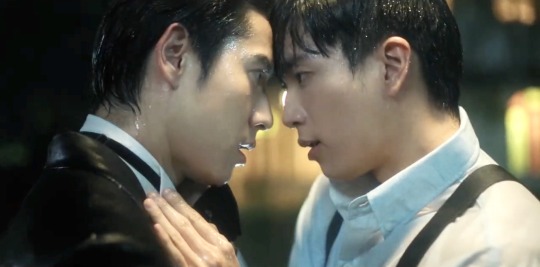
You ready for this?
The quickest of quick thoughts: I loved this show and hated the ending, but not for the reason you think.
This is gonna be one of my big meta beast-sized posts, skip to the end for the final review.
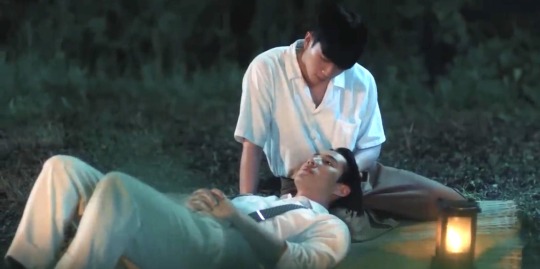
Some Historical Context for I Feel You Linger In The Air - Thailand 1925-1932
I love history and so here's some info that any Thai watcher would likely know, but the rest of us might not... ready?
The Historical Stage:
Burma (now Myanmar) to the west is occupied by the British.
The French hold Vietnam to the east.
Everyone is bickering over what would become Cambodia & Laos.
China occasionally gets involved from the North (also, lots of immigrants from China at this time accounting for a large percentage of the merchant/middle class)
Eventually, Japan would invade during WWII.
In part, The Kingdom of Siam was kept a "neutral" party because none of the surrounding colonial powers wanted to risk offending any of the other players in the area.
Siam re-negotiated sovereignty in 1920 (from USA) and in 1925 (from France & Britain). But during the time of this show (late 1929) it was back to it's customary type-rope balancing act of extreme diplomacy with the allied western colonial powers that surrounded it.
Recognizing that Thailand was never colonized (although it was invaded), it's boarders were constantly nibbled at and it was "ambassador-occupied" off and on by westerners whose military backing and exploitive business concerns simply outmatched the monarchy, especially in the technology department (as well as by reputation on the global stage at the time).
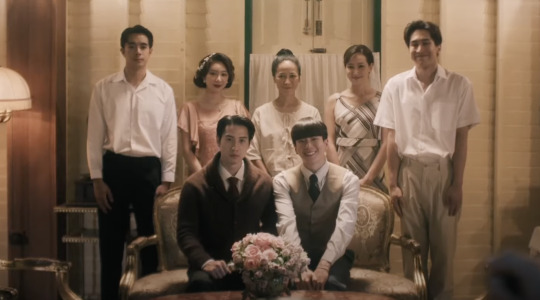
In other words, the farang in this show (James & Robert) were always gonna be both the baddies and the power players of the narrative. (Farang is the Thai word for non-Thai's of European descent, the word means guava.)
The king of Siam at the time (Vajiravudh AKA Rama VI) was initially somewhat popular but also regarded as overly extravagant since Siam had been hit by a major postwar recession in 1919. It should also be noted that King Vajiravudh had no son because he was most likely gay (which at the time did not much concern the Siamese popular opinion, except that it undermined the stability of the monarchy leaving it without an heir).
He "died suddenly" in 1925 (age 44) with the monarchy weakened and succession handed off to his younger brother.
In 1932 a small circle of the rising bourgeoisie (all of whom had studied in Europe, mostly Paris), supported by some military, seized power from the monarchy in a practically nonviolent Siamese Revolution installing a constitutional monarchy. This is mentioned in IFYLITA in the last few episodes but did not (apparently) appear in the original novel.
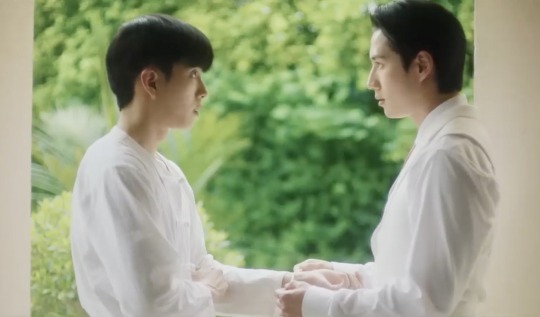
Siam would then go through:
dictatorship,
WWII,
Japanese invasion,
Allied occupation,
democratic elections,
military junta,
the Indochina wars,
communist insurgency,
more democracy and popularization movements,
multiple coups,
more junta,
more monarchy,
eventually leading us to the somewhat chaotic insanity of Thai politics we have today. (Which is, frankly, a mix of monarchy, junta, democracy, egocentric popularism, and bribery.)
The Filming of I Fell You Linger in the Air
The director if this show, Tee Bundit (Hidden Agenda, Step by Step, Lovely Writer, TharnType), has never particularly impressed or offended me as a director. I would have called him simply "workmanlike" in execution: not offensive, serviceable.
So much so that I spent some time hunting for info on IFYLITA's cinematographer (who remains uncredited on MDL) because this one, of all Tee's pantheon, is ultra stylish. It, frankly, felt too good for him.

Specifically, there is a repeated visual motif in intimacy scenes of either Yai or Jom being filmed from behind a screen/drape/curtain making them seem more translucent, like a ghost or spirit. While the other half of the pair is filmed with sharp clarity. In the first half of the series this is more likely to be Yai (an unknown and mysterious element), as the show progresses, it's more likely to be Jom (the person outside of place and time, destined to vanish all together). This cleverly conveys story, tension, and foreshadow (future shadow?)
Occasionally we shift over so they both become obscured and then clear again.
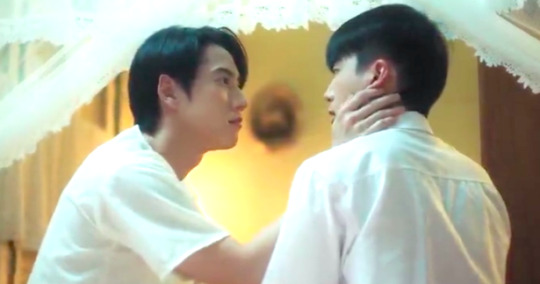
This stylized version of dirty framing and filters is used to foreshadow and then constantly remind us about that Jom slipped (and is slipping) through time and the disconnect that causes to his sense of reality and purpose, and to his burgeoning relationship.
For example, the scene where Yai is drunk and asleep in his bed. The first time Jom is sitting in a chair drawing him. Yai is blurry behind the screen while Jom is solid and sharp.
This filming technique combined with dirty and peekaboo framing is being used to give the watchers the impression of looking at something we maybe shouldn't, like we are being creepy and intruding on their private time. After all, they can see EACH OTHER clearly, it's only us who have the visual impairment.
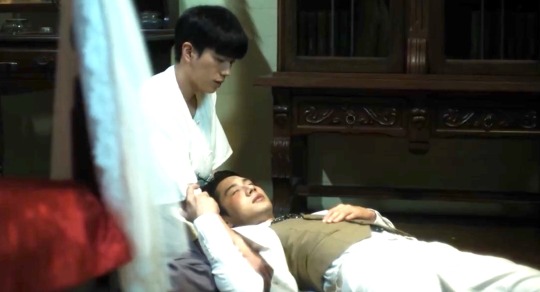
This gives us a sense of doom and discomfort and slight sensation that we shouldn't be there. We shouldn't be watching. But ALSO that we too are outside of time, filtered by the future.
In other words his sense of displacement is being used to trigger ours visually.
It's all quite clever.
It's both beautiful and atmospheric and discomforting and touch stressful. Meaning that it is ALSO a visual vehicle to drive narrative tension. As effective as scary music, perhaps more so in this show (since I personally found the musical motifs and refrains somewhat overused.)

Linguistic corner
The word for reflection and shadow is the same in Thai.
Note on the por/phor/phô honorific in Thai
I have not encountered it before in BL. I am indebted to @embraceyourfandom for the following information;
Phô is a paternal honorific, luang phô is used for respected monks. It basically means father. And is oft seen as male honorific for village elders. It's also used as a male prefix in the names of several occupations like:
พ่อครัว phô khrua (khrúa= kitchen -> chef)
พ่อค้า phô khá (khá= trade -> merchant)
พ่อมด phô mót (mót= person of occult knowledge -> wizard)
พ่อบ้าน phô bân (bân =house -> butler) - most relevant
So, Yai's use is probubly foreshadowing that Jom will be a butler for his house, and is primitively referring to him with this title.
All that said, phô can also be used by a "man who is older/higher on hierarchy to refer to a younger/lower on hierarchy man with intimacy and/or affection."
I think all this has to do with Jom's demonstration of education. Yai figured out early on that one of the reasons Jom doesn't belong and cannot fit in with the servants is that he is more educated than a peasant (of this time period), which for Yai adds up to him being originally from a higher status and possibly wealthy family, especially since Jom speaks English and has travelled (he has a non-northern accent).
There is very little Thai middle class at the beginning of the 1920s since trade is being dominated/dictated by the West, or Chinese merchant operations, and Siam is a monarchy. So for a nationalize Thai citizen educated means military, landed gentry with trade operations (like Yai), royal/political/diplomatic connections, or... none of the above. This changes, especially in the south, throughout this decade (as it did in other parts of the world). So there is a rising bourgeoisie going on in the background but it's not that obvious in Chang Mai at this time.
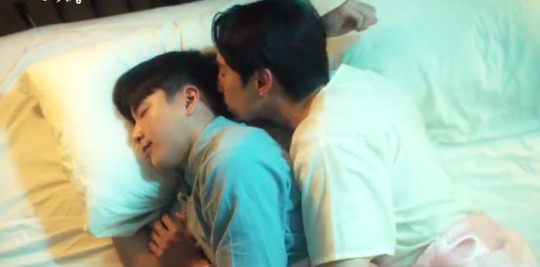
What Jom's educated lack of status means to Yai is that Jom's family either got wiped out or politically disenfranchised possibly as part of the 1912 attempted coups (or even WWI)? This would be mystifying for Yai because Jom doesn't act like he comes from a military family at all. So his background and status is very confusing for Yai, but Yai does know one thing...
Jom is NOT lower class by the standards of Yai's temporal worldview and existence.
For a young man to be educated and yet entirely alone is very dangerous and suspicious. Also, let's be clear, Jom doesn't look or act like a laborer. He red flags "cultured" all over the place.
Yai is paternalistic and caring towards Jom out the gate because Yai has a big ol'crush but also because he recognizes "his own" is trying to survive while isolated and scared.
Yai wants to rescue Jom. Yai is an ineffectual 20 year old gay intellectual. But poor thing sure tries.
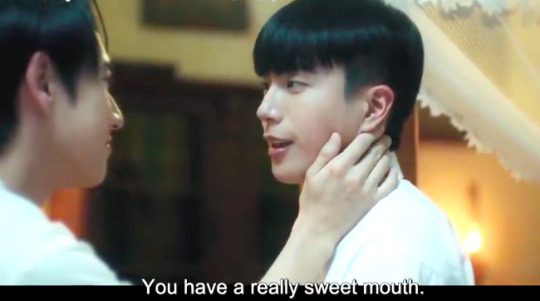

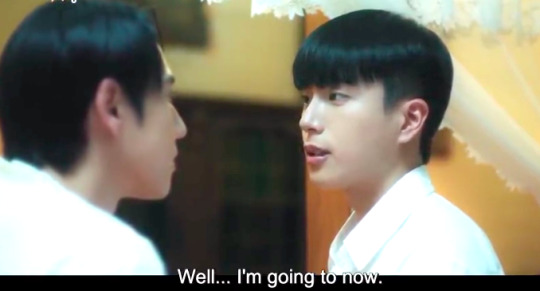
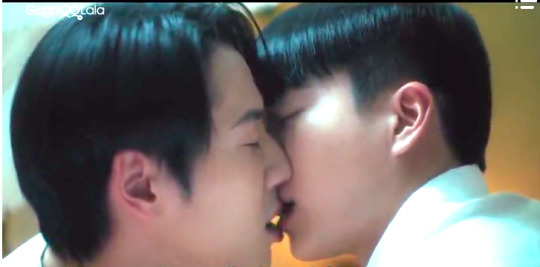
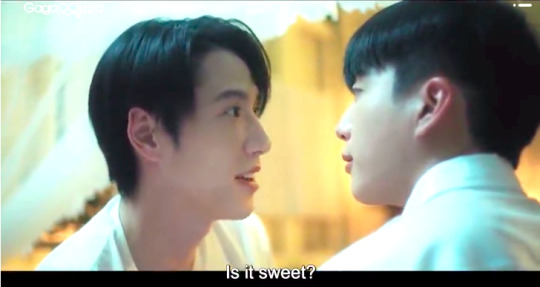
Let's Talk About How I Felt About I Feel You Linger in the Air
The historical aspect was great.
I adore historical romances and we almost never get them in BL. I was always gonna be biased towards this show. (As indeed I am towards Nobleman Ryu's Wedding, Tinted with You, and To Sir With Love.) Aside from some classic Thai BL production issues (less than normal, this is very high production value for Thailand) and my issues around the sound track and repetitive repriens (which frankly were more noticeable because I binged the last half) I have no complaints on that score (heh heh).
The surrounding support cast were all quite good and we even got us some lesbians!
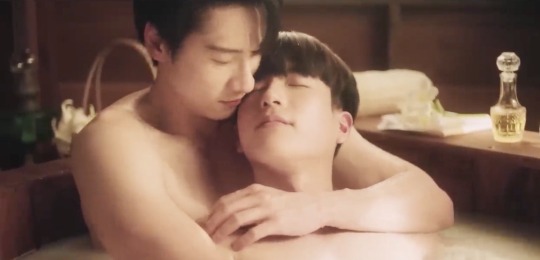
The emotional and narrative tensions were excellent.
Any issues I had with pacing came from focus on characters that didn't interest me, but probubly did interest others. I wasn’t wild or particularly interested in the family drama or the side characters/couples, but they were necessary to make this a fully fleshed story with historical context and to give Yai much needed characterization. Also this use of a ensemble cast is very close to Thailand's lakorn heart, even thought this one had way less scenery chewing ludicrous soapy drama (thank heavens).
I was delighted that external threat, stressors, and conflict drove this plot. That's refreshing in BL.
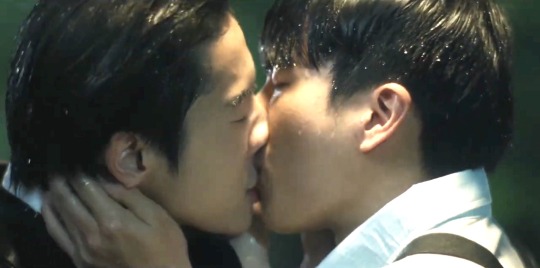
I have no arguments with the chemistry and kisses and sex scenes were tasteful and lovely, occasionally even heart-wrenching, and it's nice to see Thailand especially use physical intimacy to drive plot, and not the other way around.
I love historicals partly because every tiny touch can have such lingering significance, they're very elegant in their chaste physicality. This show didn't need to move into higher heat, but I'm grateful it did because even that was very well done. Thai BLs can often feel clumsy around intimacy, but not this one.
The final sex scene before Jom and Yai separate forever utilizes the ubiquitous director's-favorite-romantic-moments-flashbacks (required of all Asian romance dramas) but with acceleration and tension driven by the noises of sex, which I've never seen/heard done before. In other words: climax of sex = climax of the romance story, I see what you did there, Tee. Clever. Very clever. Bit on the nose… erm… on the… well you know what I mean.
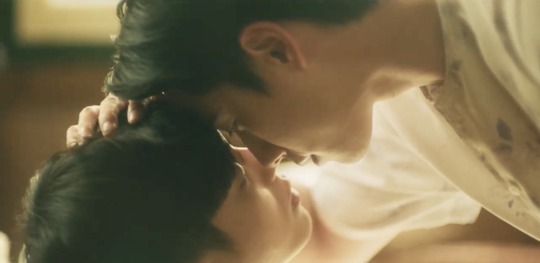
Like all Thai BLs this wasn’t perfect, but for me this is as close as Thai BL gets to high quality romance and that’s what I want the most from my drama watching experience (if not necessarily my Thai BL experience).
But... and you knew the but was coming didn't you?
I absolutely hated the ending.
It wasn't sad, don't worry, but it also wasn't good.
There is a long drawn out separations sequence and then Jom returns to the present, drowning from a car accident. Jom is "rescued" by an moustachioed iteration of Yai from the distant past (who we met once before) and then wakes in hospital. Some time later, Jom returns to the house in Chang Mai where Yai turns up and they reunite.
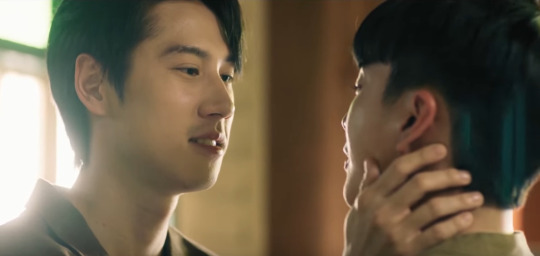
The end.
There is a stinger featuring Jom once more hurled back in time, only further, meeting the warrior mustache Yai once more.
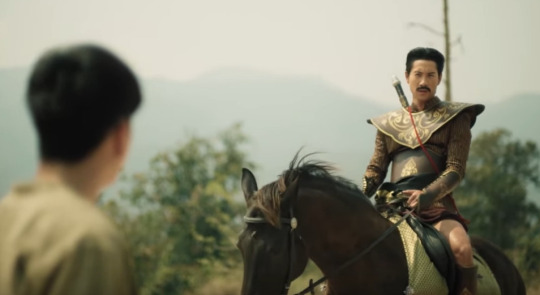
Okay, that's all I knew and all I saw.
Confused? So was I.
If this had been a regular time travel romance: Yai would have been the EMT or doctor attending Jom when he woke up and their "this time period" romance would commence. With either shared memories, or not.
Had this been set up for audience comprehension in line with the original novel, we should have had flashbacks from both Present Yai (he's not the same one, as it turns out) and deep-past Moustache Yai interwoven throughout the series. Preferably with some focus on Present Yai's quest for reunion with Present Jom AND Present Yai's own experience with visions and memory of his past lives.
A full explanation of the ending is here. This explanation of the 3 different Yais makes me like our ending more. But I shouldn't need to read Cliff's notes from some random y-novel reading fan on Tumblr to understand what's going on in a series!
There is supposedly a special happening with Jom + Present Yai.
There was unquestionably a failure in adaptation in the finale of this show.
As a fan and watcher, what I actually felt was deeply confused and hurt.
I also felt that this was a disingenuous un-earned throw away happy ending, since I had no idea who this new Present Yai was and no investment in his character. I simply didn't believe he was the same Yai (Bright is too good an actor, he was clearly a different older personality).
So the fact remains that past Yai, our Yai, the 20 year old boy we grew to understand and love, is abandoned in the past to suffer alone for the rest of his life. And THAT is an unhappy ending for one half of my beloved pair. Yes Jom gets a new Yai in the present day, but it's not the same Yai. They have no developed relationship, and Jom is doomed to leave even this new Yai and slide into the past once more. That's barely even happy for now for Jom's character.
As a result of my deep sadness for 20-year-old Yai in particular, I'm not going to be able to rewatch this show. The whole thing was rendered not just confusing but the opposite of comforting by the final 15 minutes. I'm tempted to dock it two whole points - one for the ending and the other for the lack of rewatch potential.
But the first 11.5 eps were SO GOOD.
This is one of the only times where I am actually hoping for a second season, while simultaneously being wary of the screen writing and production team's capacity to give us a satisfying one.
Industry wise? I honestly don't think we can hope too hard for a full season 2. This was an expensive show with flawed/limited distribution and little sponsorship. I don't see how they'll get funding for a second season. Unless we see this show up on like Netflix or Viki, I urge you not to hope too hard and be disappointed.
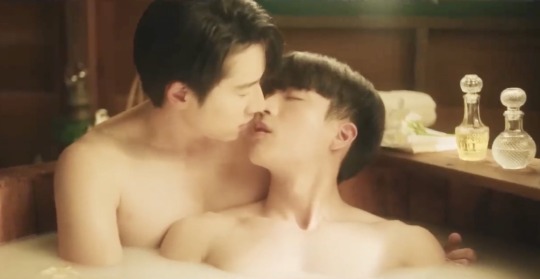
In all honestly?
I started typing up this blog post thinking Thailand was finally, after 5 years, going to earn another 10/10 from me but I just can't in good conscious give it that. It's been days and I'm still upset about that last episode.
And Now My Quick Pitch Review
I truly loved this time travel romance. IFYLITA is an exquisite BL, from filming techniques to narrative framework (much like Until We Meet Again). Steeped in history and family drama it edges into lakorn (but no as much as To Sir With Love and with way less scenery chewing). This is an elegant and classy BL... from Thailand which normally doesn't even try for classy. The main couple (both as a pair and individuals) were excellent, particularly Bright (Yai) whose eye-work acting style is a personal favorite of mine. Pity about the ending. Oh it wasn’t that sad but it wasn’t good either. This show should easily have earned a 10 from me except that it fumbled the… erm… balls. Argh. Whatever. 9/10
(source)
This post is also in My Drama List as a review.
#I Fell You Linger in the Air#Thai BL#BL review#I have LOTS of thoughts#Filming analysis#historical context#lanaguage and lingsuitic use#BrightNonkul#YaiJom#Tee Bundit
139 notes
·
View notes
Text
HEAD 👏 CANON 👏 RAMBLE 👏 TIME👏
Alright
I believe that both Junko & Mukuro were born on an American military base, are a stand in for american imperialism/manifest destiny and are likely WASP Americans.
NOW BEFORE YOU THINK I'M TOTALLY WHACK FOR THIS, JUST HEAR ME OUT!
For starters, Mukuro clearly went to a Western Military Academy {Fenrir} & in that one piece of official art where she is in uniform, the uniform in question bears a striking resemblance to something worn by the U.S Marines and it does not align with any JSDF military gear.
Second, Mukuro Ikusaba & Junko Enoshima are clearly not their actual names. They are aliases. The name "Mukuro" itself means "Corpse," and frankly, that is a name no parent would ever give their child, and the two sisters lack a shared surname {Both of which are clearly not average surnames, considering Ikusaba is "Battleblade" and Enoshima is the name of an Island that is a popular tourist destination}. With this information, we can conclude that their actual surnames could be anything, perhaps even something like "Ellenbogen" or "Vanderpump."
Third, these girls look whiter than the devil. I know that Junko's Ultimate in Japanese is the "Ultimate Gyaru" which is a subculture that has western influence and that mixed people can turn out incredibly white passing, and I speak from experience as a white passing mixed person myself. But like, we dont know where their parents came from, Junko and Mukuro dont really have concrete backstories explaining how they turned out the way they did, and this just allows for creative headcanons. And the way I see them from my personal lens is that they are the epitome of stereotypical white privilege, born and raised on a military base, believing in american superiority & ready to commit manifest destiny through spreading despair and causing the great tragedy.
4th and final point, in the english dub of the danganronpa anime {I dislike it, but just this feeds the headcanon} they gave Junko what I can only describe as the "Stereotypical White Girl/Valley Girl Accent Cranked Up To 100", and as much as this is debatable considering it is the english dub, I will use this as part of my headcanon.
In conclusion, the despair sisters are peak Pumpkin Spice Latte, Unseasoned Chicken Breast, American Flag levels of white.
Thank you for coming to my Headcanon TED Talk, and I am sure this isn't the wildest headcanon you've seen.
Honorable Mention: Some of my friends repeatedly refer to Junko Enoshima as "Jemima Ellenbogen" as that is the collective headcanon we have surrounding her "actual name".
Disclaimer! This is just my headcanon, and I beg of you not to flame me for it!
#danganronpa#danganronpa headcanon#danganronpa thh#danganronpa 2#danganronpa 3#junko enoshima#mukuro ikusaba#please dont flame me
11 notes
·
View notes
Text

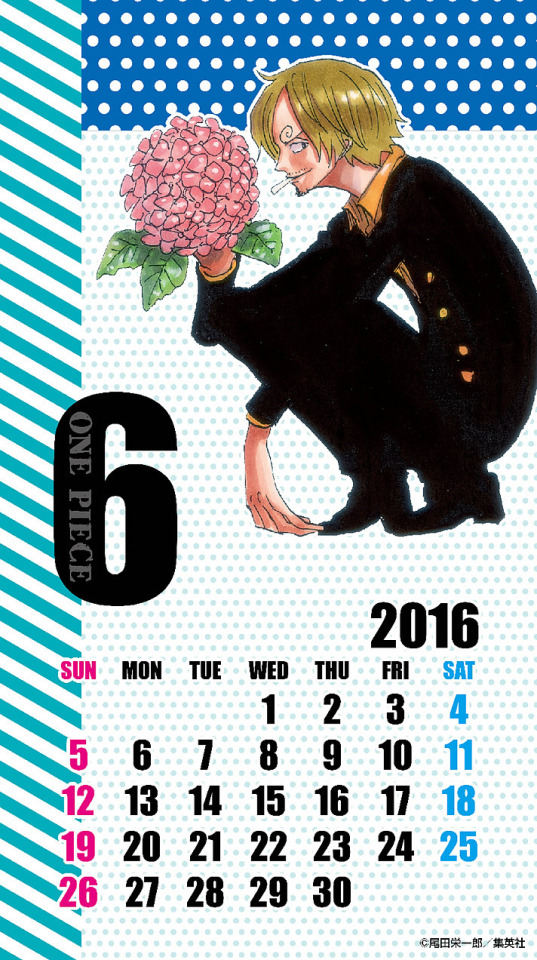

Those two Sanji and Nami pictures were floating around as edits or crops vaguely in the internet and I couldn't find what they were originally from for the life of me. The only source I saw was what looks to be a 2016 calendar, as seen above, but there's no posts about this product online.
For one, nice Nami placement *ahem* (March, number 3). Though, because I can't find who or what goes on the July month, I can't really say much about it.
Hydrangeas are very strongly associated with the month of June in Japan so the Sanji one might be nothing overly important either (especially if this picture is made especially for the calendar, and not cropped off a bigger picture).
Shipping hyperthink time! I still feel that it does have SaNami vibes, though.
The hydrangea also has a very interesting set of mixed and even contradicting meanings to it in Japan. It means "fickle", because it can change colours. The pink ones specifically also means "vivacious woman", a meaning that Japanese people adopted from foreign flower languages. It also means "patient and enduring love".
I mean, you know. Sanji makes heart eyes to many girls, but there's only one person who is truly special. Similar to the meaning of the hydrangea.
By the way, some English websites mentioned a Japanese legend involving hydrangeas having the meaning of "apology", but Japanese website specifically says no such legend exist and suggest that people in the past might have gotten it mixed up with legends from other places.
Non-Sanami related angst and drama about hydrangeas below:
The origin of the "enduring love" supposedly was based on the love story between German botanist and physician Philipp Franz von Siebold and a Japanese woman named Taki. Japanese law says they cannot be legally married at the time, but he told his family back home that she was his one and only wife.
The doctor was so in love with his wife, that he named one of the subspecies of hydrangea "Otakusa/Otaksa" (an imperfect transliteration of "O-Taki-san") after her. However, they had to be separated when Siebold was kicked out from Japan.
Japanese lore says that the two continued to love each other despite their separation, with one of Siebold's remaining letters saying "Who could possibly love you more than I" (!!!!) to both Taki and their daughter Ine. Eventually they both had to remarry other people. Even though their love story ended with no "happy end", hydrangeas became a symbol of enduring love. In Nagasaki, where those two met, people still call hydrangea with "otakusa".
Their daughter was acclaimed as the first female physician certified in Western medicine.
54 notes
·
View notes
Note
Hello! I wanted to ask what brands you like to buy traditional art supplies from. I've been buying Winsor & Newton products along with some Faber Castell stuff and I wanna see what you use and recommend.
Thank you and have a great day! :)
I mix and match depending on needs. People will swear by one brand, and an equal amount of people think it's mid at best.
For example: Windsor and Newton never behaves nicely for me. I live in a primarily hot, dry climate and so working wet consistently is a non-starter. If I'm doing plein air, the paints WILL dry out. And I've found M Graham to be the best quality paint I can purchase in a tube that won't crack when dry, and rewets good as new. It owes this quality to its honey binder. I also love me Beam Paints, an indigenous paint company in Canada that, like M Graham, uses honey binder. It's pricey but one set goes a LONNG way.
I tend to seek out brands beyond Windsor and Newton too because WnN is so common, I just want to see what else there is. And I've been rewarded for that search.
Faber and Castell served me well for an initial set of ink liners (similar to micron), but I'm more in favor of Japanese brands nowadays. Their scripting techniques mean a wide array of accessible drawing tools with the kind of flex and bounce far superior quality to felt tip pens in Western media. They last too. I have 10+ yr old Pentel Pocket Brushes that I continue to use.
I've been having fun watching a lot of Youtube videos by artists describing their preferred materials. Do note: for actual shopping suggestions take them from the ones who draw or paint like you want to. I've seen people recommend Himi gouache all over Youtube, but most gouache painters would give you a litany of reasons why it's not a good investment beyond "fun to play with". Thing is, Himi sends gouache sets all over art-Youtube and whenver you get free stuff, you're gonna want to say nice things in return. Keep that in mind.
But it's still the same advice: get what you need based on your needs. Don't get super expensive stuff if you're just trying out, but don't get stuff that's such subpar quality that you want to chuck the media at the wall in frustration (You want to make that wannabe Jackson Pollock on purpose at least). There's plenty of cheaper and mid-tier media that's perfectly find for long term use.
But an all-around solid recommendation is Canson paper. Canson is imo way better than Strathmore and at about the same price point and just as common. It can take a beating. Get a Canson sketchbook. Any of them are good. I love Canson.
30 notes
·
View notes
Note
Dear Peppertaemint,
This unnecessary mess with Taemin and fan behavior has made me think about different levels of disclosure within the fandom community, the industry, if there are limits and who should be aware of them. I have some questions, more like openings to get some food for thought because I don't think there's some definitive answer to this.
Do you think an idol should be more careful when they disclose information regarding career management? I couldn't help but think of a similar situation with Jimin when he casually revealed in an interview with Japanese media that BH considered having a music video for the entire album an unreasonable request. That led to uproar and I admit I was surprised and angry myself. But then again, Jimin didn't elaborate more on that aspect and the matter hasn't been brought up again. I believe that the situation with Taemin is sort of similar, as in he made a statement on a live stream which was taken as an indication of mismanagement by SM. Do you take they should be more careful on how idols phrase their statements? Perhaps either elaborate more, knowing how the fandoms are behaving lately? Should they take that into consideration? Or perhaps they have no part in how fans are reacting?
Hi @reflections-in-a-critical-eye <3 I love that you sent an official Ask, lol.

I've been thinking about this since the mess started, and although it is complicated, I think it's a mix of pervasive low EQ as well as the Western savior complex at play.
It would be a shame if artists felt they couldn't share what they already do with us. I appreciate Taemin's honesty, even if it creates chaos. I wouldn't want him to stop being himself because of fan behavior. Apparently, that's what happened with NCT Ten due to fan behavior, and now he barely comes to Bubble or anywhere to speak to fans. :( And we know Jimin really limits what he shares, too, so we wouldn't want that relationship damaged further.
What I think is required is EQ on behalf of the fans. This feels silly to write, but it's sort of EQ 101 that is helpful for everyday life. Emotions can be contagious and some people are more prone to catching them than others. Having healthy boundaries means not accepting everyone else's emotions. If an artist says "I'm upset" that doesn't mean you have to take on that upset.
Another part of EQ, complicated by social media, is how we interpret each other's emotions. In-person, someone can say, "I'm disappointed by this," and as the listener, we're using verbal and non-verbal cues to understand the full meaning of what is being said. How upset is the person, how much has it affected them, do they seem okay, are they sharing to unburden themselves, does the issue seem resolved? These are all questions that often go through a person's head when they're confronted with someone sharing their thoughts and feelings. When this happens in person, it's a natural process for most of us.
When we're encountering a piece of media, for some, it's much harder to engage in these EQ processes. When Taemin sends Bubble messages, unless he adds a specific marker of tone (like the Korean "haha" or "keke" or some other emoji or face), it's up to us to interpret the extra bits. We don't know if he was crying while sending these messages or playing Nintendo or something, totally fine (I don't think he was crying, btw; I am just using that as an example!).
I'm not sure what Jimin's non-verbal communication was when he dropped the bit about the label denying him music videos for all songs on his album. If he was smiling while saying it, that would be a signal that although a disappointment, what happened is okay. When Taemin said he was disappointed, he wasn't sad or distraught. Those non-verbal cues told me that, although it wasn't what he'd hoped for, things were okay and this wasn't something to dwell on. Instead, many people latched onto his disappointment and took an emotion that maybe seemed to be at like, an intensity of 3 (to me) and ratcheted it up to a 10. This isn't good for anyone, and especially not him.
The other side of this is fan as a Western savior (colonialist!). It's a constant issue when it comes to international fans of Kpop, many who are Western and perceive that Western ways are superior, and that success in the West is of greater value than success in any part of Asia. They also feel that they "know better" than industry people in SK (and often even their artist!), and that they must demonstrate activism on social media to "save" their artist.
A good example of this is that even when international SHINee fans were confronted with K fans asking them to stop engaging in online activism about Taemin's performances because it would be damaging to him to continue, they did not stop. Being confronted with cultural context (K fans were explaining that what they were doing wasn't good culturally and was reflecting poorly on him), they did no self-reflection but carried on, trying to "save" their artist.
There are a lot of nuances of Korean culture that feel counterintuitive to non-Koreans. I had a Korean friend tell me that I should use filters on my thoughts and opinions in writing so people understand clearly that I'm stating my thoughts and opinions, such as "I think that..." etc. At the time, I thought it was odd and a misunderstanding of rhetorical writing (LOL, me being an asshole), but later in my study of the Korean language, I learned that this is how people are expected to express thoughts and opinions in Korean and the language is set up to enable this. It's considered impolite or aggressive to use different constructions. So, in this way, I'm not surprised that international fans struggle to understand the Korean perspective. It's subtle and nuanced and might feel counterintuitive to them depending on their home culture.
There is one other facet to consider, and that's just plain bias. We are biased toward our favorites and want them to have everything. And how dare anyone not give them exactly what they want. Fans are like out-of-control parents at their worst, lol. So, even if a calm and perfectly fine Taemin says "I'm disappointed because of X", a swathe of people will go into crazy mommy mode. Give my baby boy everything!!!
Anyway, this is probably a too-long reply, but this is my take on what's happening here. I don't think idols need to change their behavior, even if part of me thought, Taemin, you've really done it now. LOL. There is a fundamental difference between sharing honest emotions and fans struggling to parse them versus situations where bullying and harassment are thanked or congratulated (RM), or someone saying they received death threats from fans is met with silence (BTS). Even though Taemin's words did spark the fan debacle, he still took responsibility for it all and spoke about Yeonjun when his junior was being slammed online. While it's true he made no mention of the girl group who covered Guilty, I think he mentioned Yeonjun specifically because of the fan's bad behavior.
Jimin may have deserved an infinite budget for his debut album, and I certainly would have loved to see more beautiful, dance-focused MVs from him, especially in a larger project a la Lemonade. But, that wasn't in the cards this time, for whatever reason. It's understandable to be disappointed by this. If I heard Taemin wanted a visual album and didn't get it, I'd be so sad. But I guess there is a final EQ point to be made. Just because we feel sad or angry, as you mentioned, that doesn't mean we have to act on it... Were you secretly emailing expletive-laden missives to Big Hit, hmm? Did you launch "akgae" campaigns online against other BTS members in hopes that they'd be sidelined so Jimin could get a bigger budget? Do you have a secret DC Gallery account?
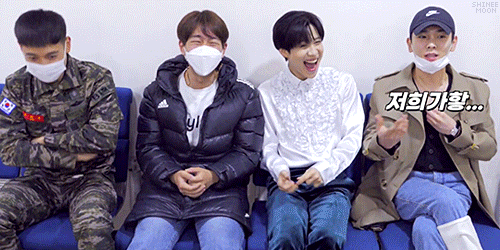
#Ask#it's such an interesting subject#I don't think artists are absolved of responsibility when it comes to fan behavior#and I think he knows that and that's why he said something
19 notes
·
View notes
Note
I've seen this one person who, on account of knowing a fair bit of Japanese, has actually seen old-timey serial toku from the late 50's-early 60's like Gekko Kamen, & not only always praises them, but holds more conventional showa toku like Rider & Zubat against them! & I think that's genuinely really fascinating & thought provoking! Makes you wonder how much perspective is lost on us because of the language barrier stopping us from watching those shows, it also brings to mind how when we measure stuff like art, we only do so relative to what WE know!
sorry it was incredibly funny receiving this ask because i feel like this is the experience that anyone who tries to talk to me about western media has when they inevitably run into the brick fucking wall that is the fact that i just apparently did not go through US Kids to Adolescents Media Bootcamp and have the world's spottiest baseline of what you're supposed to know. i mean like yeah sure i've never seen shit like titanic that's an easy one to miss but i just learned who king arthur was last year. i've been boycotting disney since i had a concept of what a company was. i just straight up didn't watch live tv after 2nd grade. my friend had to explain what danny phantom was to me this past weekend. all the shakespeare i know (2) was taught to me against my will.
anyway where was i. i typed up something first but it got way too long. i do think it is interesting to think about how we're only able to comprehend and analyze media through the lens of our experiences in life up to that point but [gesturing above] i am Dumb Ass Rocks and i think that's why whenever i make certain statements about media i feel the need to put in a disclaimer that gives at least some idea of where i'm coming from so people don't expect me to know things i simply don't? it's something that i've had to become very aware of through the years and i think a lot a lot a lot of miscommunication is due to the fact that people are assuming that other people around them have the same understanding or background information or reading of something. i think if you want to talk language barriers there's a point to be brought up too about how translation is an artform and a really beautiful one; you're essentially being a middleman for understanding between the author and the reader but because they're relying on the translator to decode and recode the meaning in their own words, we've now got an additional person in the mix having to balance THEIR knowledge base, so i am wrENCHING MYSELF AWAY FROM THE KEYBOARD I'M GOING OFF TRACK AGAIN-
i think it's good enough to just find enjoyment in the things that you find enjoyment in! unless you're looking to do serious (i.e. academic style) analysis i'm anti-completionist and think everyone should simply leave if they're not enjoying something. doesn't matter how late in the game. i'll watch a whole show and not the final episode if it sucks. i watched bojack horseman thrice but there's one episode i simply won't watch because i started it and hated it. i just watched as much of the show as i cared to and enjoyed it! and in that same vein if you aren't able to access a part of a series/genre/what have you due to time/language/cost/bald/other constraints in my Humble Onion you can just take the enjoyment out of the parts you're able to access. no use dreaming about the things that could be when you have perfectly good shows right there!
#sorry i went off the rails here. there's more i could say but i doN'T NECESSARILY THINK THIS IS WHAT YOU WERE GOING FOR#BUT IT'S WHAT YOU'RE GETTING.
8 notes
·
View notes